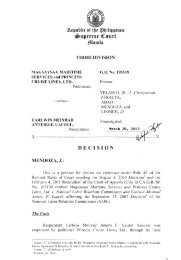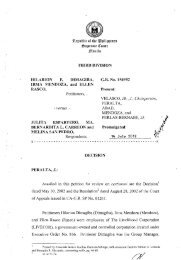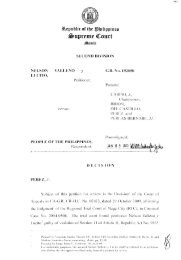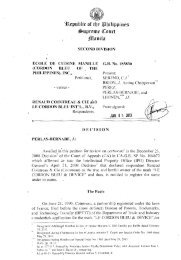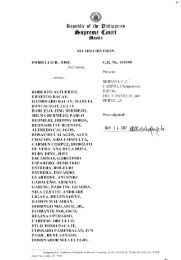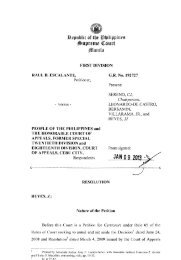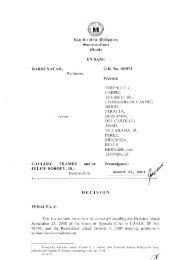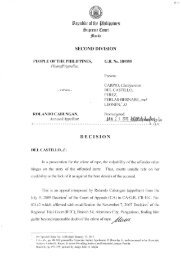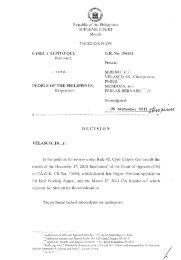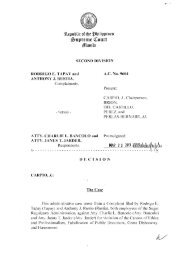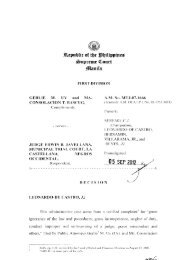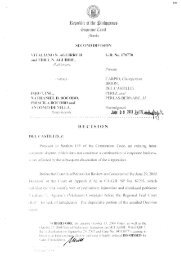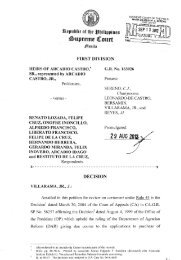G.R. No. 162372. September 11, 2012 - Supreme Court of the ...
G.R. No. 162372. September 11, 2012 - Supreme Court of the ...
G.R. No. 162372. September 11, 2012 - Supreme Court of the ...
Create successful ePaper yourself
Turn your PDF publications into a flip-book with our unique Google optimized e-Paper software.
RESOLUTION 7 G.R. <strong>No</strong>. 162372<br />
[T]here is unjust enrichment when a person unjustly retains a benefit to <strong>the</strong><br />
loss <strong>of</strong> ano<strong>the</strong>r, or when a person retains money or property <strong>of</strong> ano<strong>the</strong>r<br />
against <strong>the</strong> fundamental principles <strong>of</strong> justice, equity and good conscience.<br />
x x x. 13 (Citation omitted.)<br />
In <strong>the</strong> same case, we added that “[t]here is no unjust enrichment when<br />
<strong>the</strong> person who will benefit has a valid claim to such benefit.” 14 Because <strong>the</strong><br />
GSIS RFP, which we repeat, is contrary to law, thus void and <strong>of</strong> no effect,<br />
<strong>the</strong> enrichment <strong>of</strong> <strong>the</strong> payees is without just or legal ground. Therefore, <strong>the</strong><br />
payees have no valid claim to <strong>the</strong> benefits <strong>the</strong>y received under <strong>the</strong> GSIS<br />
RFP.<br />
The payees received <strong>the</strong> disallowed benefits with <strong>the</strong> mistaken belief<br />
that <strong>the</strong>y were entitled to <strong>the</strong> same under <strong>the</strong> GSIS RFP. Article 1456 <strong>of</strong> <strong>the</strong><br />
Civil Code, which is applicable in this case, reads:<br />
If property is acquired through mistake or fraud, <strong>the</strong> person obtaining it is,<br />
by force <strong>of</strong> law, considered a trustee <strong>of</strong> an implied trust for <strong>the</strong> benefit <strong>of</strong><br />
<strong>the</strong> person from whom <strong>the</strong> property comes.<br />
Construing <strong>the</strong> above provision, this <strong>Court</strong>, in Aznar Bro<strong>the</strong>rs Realty<br />
Company v. Aying, 15 quoted established jurisprudence as follows:<br />
A deeper analysis <strong>of</strong> Article 1456 reveals that it is not a trust in <strong>the</strong><br />
technical sense for in a typical trust, confidence is reposed in one person<br />
who is named a trustee for <strong>the</strong> benefit <strong>of</strong> ano<strong>the</strong>r who is called <strong>the</strong> cestui<br />
que trust, respecting property which is held by <strong>the</strong> trustee for <strong>the</strong> benefit <strong>of</strong><br />
<strong>the</strong> cestui que trust. A constructive trust, unlike an express trust, does not<br />
emanate from, or generate a fiduciary relation. While in an express trust, a<br />
beneficiary and a trustee are linked by confidential or fiduciary relations,<br />
in a constructive trust, <strong>the</strong>re is nei<strong>the</strong>r a promise nor any fiduciary relation<br />
to speak <strong>of</strong> and <strong>the</strong> so-called trustee nei<strong>the</strong>r accepts any trust nor intends<br />
holding <strong>the</strong> property for <strong>the</strong> beneficiary.<br />
x x x x<br />
13 Id. at 384.<br />
14 Id.<br />
15 497 Phil. 788 (2005).



